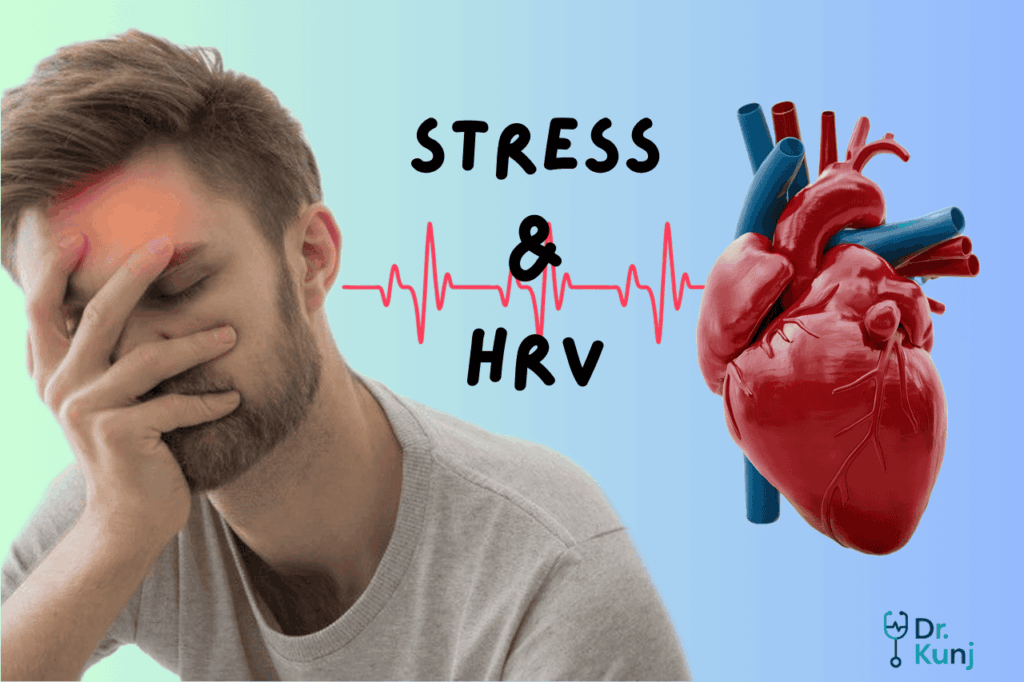Did you know your Autonomous Nervous System is in a constant balancing act—and stress loves to tip the scale? When stress dominates, your body’s natural rhythms get disrupted, and one of the clearest indicators of this imbalance is heart rate variability (HRV).
Understanding the connection between stress and HRV isn’t just science—it’s the key to unlocking better energy, sleep, and long-term health. Let’s dive in.
What is Heart Rate Variability (HRV)?
Most people think of heart health in terms of heart rate: how many times your heart beats per minute. But HRV is about something deeper.
Heart rate variability measures the tiny variations in time between each heartbeat.
- High HRV = Your system is flexible, adapting smoothly between activity and recovery.
- Low HRV = Your body is stuck in “survival mode,” unable to bounce back efficiently.
- Think of HRV as your body’s adaptability score. The higher it is, the better your nervous system can respond to stressors and return to balance.
How Stress Impacts HRV
The Nervous System Tug-of-War
Your autonomic nervous system (ANS) has two main branches:
- Sympathetic Nervous System (SNS): The gas pedal. Triggers “fight-or-flight,” raises heart rate, and floods the body with energy.
- Parasympathetic Nervous System (PNS): The brake pedal. Activates “rest-and-digest,” slows heart rate, and promotes recovery.
In a balanced system, the gas and brake work together seamlessly. Stress hormones like norepinephrine, adrenaline, and cortisol tilt the system toward the SNS, keeping you in “go mode.”
The HRV Effect
When stress is chronic, the parasympathetic system gets sidelined. HRV drops, signaling that your body is less resilient and recovery is impaired. In simple terms, you’re driving with the gas pedal stuck and the brakes disconnected.
Why Low HRV Matters
A consistently low HRV isn’t just a number—it’s a red flag for your health. Research shows that low HRV is linked to:
- Fatigue and daytime sluggishness
- Anxiety and mood disturbances
- Poor sleep quality
- Slower recovery after workouts
- Increased risk of cardiovascular problems
- Higher likelihood of burnout
Your body wasn’t built to live in a high-alert state 24/7. Without adequate recovery, even small stressors start to feel overwhelming.Stress and HRV: Everyday Life in Survival Mode
The Survival Trap
When HRV drops, your body begins to interpret everyday situations—work deadlines, traffic jams, even notifications on your phone—as threats. That means:
- Digestion slows.
- Muscles stay tense.
- Sleep becomes shallow.
- Energy drains faster.
It’s as if your system is preparing for danger all the time, even when you’re just trying to rest.
Long-Term Costs
Over time, living in this survival state erodes both mental and physical health. Chronic stress shortens attention span, reduces motivation, and weakens immunity. Low HRV is often an early warning sign before these health issues fully manifest.
How to Improve HRV and Reduce Stress
The good news? HRV isn’t fixed. By supporting your nervous system, you can raise HRV and build resilience against stress.
Mindfulness and Meditation
Mindfulness-based practices calm the sympathetic system and activate parasympathetic pathways. Just 10–15 minutes a day of meditation, guided breathing, or body scans can significantly boost HRV over time.
Breathing Techniques
Diaphragmatic also called abdominal or belly breathing, is especially powerful. Try this exercise:
- Sit comfortably with support in your back.
- Breathe in through nose for 4 to 6 seconds, focusing on your belly rising.
- Hold for 2 seconds.
- Exhale through your mouth for 4 to 6 seconds let you belly fall inward.
- Repeat for 5 minutes.
This simple practice engages the vagus nerve, directly enhancing HRV.
Sleep Optimization
Sleep is your body’s reset button. To improve HRV:
- Aim for 7–9 hours nightly.
- Keep your bedroom cool, dark, and quiet.
- Avoid blue light screens at least an hour before bed.
When you sleep well, your body naturally recalibrates stress hormones and HRV improves.
Movement and Exercise
Physical activity lowers stress hormones and raises HRV—but intensity matters.
- Aerobic exercise (like walking, cycling, swimming) supports cardiovascular health.
- Yoga and Tai Chi combine movement and mindfulness, giving HRV an extra boost.
- Avoid overtraining, which can temporarily lower HRV. Balance is key.
Social Connection
Human connection is medicine for stress. Studies show social support lowers pain, reduces cortisol, and raises HRV.
- Schedule weekly time with friends or family.
- Even a 5-minute phone call can shift your nervous system into recovery mode.
- In-person interactions are especially powerful for nervous system balance.
Gratitude and Journaling
Positive emotions strengthen resilience. Try ending your day by writing down three things you’re grateful for. This habit lowers stress, promotes better sleep, and supports long-term HRV improvements.
Technology and HRV Tracking
Modern wearables make it easier than ever to track HRV daily. Devices like smartwatches, fitness trackers, and chest straps provide real-time insights into your nervous system balance.
Why Track HRV?
- Spot early signs of stress overload.
- Adjust lifestyle choices—like sleep, exercise, or recovery—accordingly.
- Celebrate progress as HRV trends upward with consistent self-care.
Tracking HRV empowers you to make informed choices about how to manage stress in real time.
Putting It All Together
Stress and HRV are two sides of the same coin. Chronic stress pushes HRV down, signaling reduced adaptability and recovery. But by actively managing stress—through mindfulness, sleep, movement, and connection—you can boost HRV, restore balance, and protect your long-term health.
Think of HRV as a daily report card for your nervous system. Small lifestyle changes can raise your score, helping you shift from survival mode to thriving mode.
Final Thoughts
Stress is inevitable, but staying stuck in it doesn’t have to be. By understanding the link between stress and HRV (Heart Rate Variability), you can take meaningful steps to safeguard your energy, resilience, and overall well-being.
Your health depends on finding balance between the gas pedal and the brake. Support your HRV, and you’ll not only feel better—you’ll live better. For more information watch the video.
Disclaimer: This article is for educational purposes only and is not medical advice.



